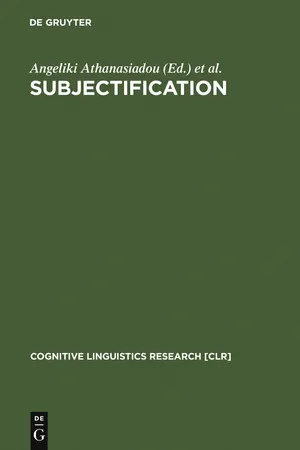Languages & Linguistics
Subjective Description
Subjective description refers to a type of description that is based on personal opinions, feelings, and interpretations. It is often used in creative writing and literature to convey emotions and sensory experiences. In linguistics, subjective description can be used to analyze language use and how it reflects the speaker's attitudes and beliefs.
Written by Perlego with AI-assistance
Related key terms
1 of 5
3 Key excerpts on "Subjective Description"
- eBook - PDF
Subjectification
Various Paths to Subjectivity
- Angeliki Athanasiadou, Costas Canakis, Bert Cornillie, Angeliki Athanasiadou, Costas Canakis, Bert Cornillie(Authors)
- 2011(Publication Date)
- De Gruyter Mouton(Publisher)
Adjectives and subjectivity* Angeliki Athanasiadou 1. Introduction Subjectivity has been established as a major topic of cognitive linguistics as it plays a very important role in how meaning is created and construed. 1 Its operation has been applied to verbs, concerning the extension from lexical to modal verbs or auxiliaries, (Langacker 1990, 1997, 1998, 1999, 2003, this volume; Traugott 1989, 1995; Carey 1995; Sanders and Spooren 1996, 1997), to prepositions, conjunctions and discourse markers (Lan-gacker 1990, 1998, 1999; Traugott 1995, 1999), to grammatical relations coded by reciprocals (Kemmer 1995) or by word order (Stein 1995), to areas of syntax (Company this volume; Verhagen 1995, 2001, and in this volume), to domains such as conditionality (Akatsuka 1997; Nikiforidou and Katis 2000), to name just a few contributions to the field. In this paper I will be concerned with adjective uses, and with the dif-ferent positions they occupy in the conceptual and syntactic spectrum. * I would like to thank Rene Dirven, the two anonymous reviewers, the two edi-tors of the volume and the series editors for constructive suggestions and com-ments on an earlier version of this paper. I am solely responsible for the views which follow. 1. Benveniste (1971[1958]: 225) was the first to characterize subjectivity as the ability of speakers to view themselves as subjects and examines how common grammatical categories contribute to this capacity of speakers. Lyons (1982: 107) claims that a subjective point of view is conveyed when it reveals the speaker's consciousness of himself/herself (I remember switching off the light) whereas an objective point of view is conveyed when it can be interpreted as a report of an event in which the speakers mention themselves as participants (/ remember myself switching off the light). - eBook - PDF
Pragmatics and Corpus Linguistics
A Mutualistic Entente
- Jesús Romero-Trillo(Author)
- 2008(Publication Date)
- De Gruyter Mouton(Publisher)
1 Online at http://www.askoxford.com , accessed 16.6.2006. 2 I am indebted to Anne-Marie Simon-Vandenbergen for sowing the seeds of the idea on which this work is based, as well as for comments on an earlier draft. I also wish to thank Lachlan Mackenzie and Francisco Gonzálvez García for their comments and suggestions. 38 Christopher S. Butler 2. Different interpretations of subjectivity In an early discussion of subjectivity in language, Benveniste (1971: 225) observes: “Language is marked so deeply by the expression of subjectivity that one might ask if it could still function and be called language if it were constructed otherwise”. Here, Benveniste is concerned with the ability of speakers to regard themselves as subjects, particularly with regard to per-son deixis. Lyons (1982: 102), also writing about subjectivity in relation to deixis, describes subjectivity as “the way in which natural languages, in their structure and their normal manner of operation, provide for the locu-tionary agent’s expression of himself and of his attitudes and beliefs”. This theme is also taken up in Traugott’s work on the diachronic dimension of language: Traugott (1989: 35) defines subjectification as a process whereby “meanings become increasingly based in the speaker’s subjective belief state/attitude toward the proposition”, and studies this process in relation to grammaticalisation (see Traugott 1995, 2003), while pointing out that it is also relevant to matters of lexical change (Traugott 2003: 634). Subjectifi-cation thus involves a process of ‘pragmatic strengthening’, by which original propositional meanings come to have an expressive function (Trau-gott 1982: 256, 2003: 633), and indeed this process is sometimes referred to as pragmaticalisation (see e.g. Erman and Kotsinas 1993; Aijmer 1997: 2). - eBook - PDF
- Jürgen Klein, Vanderbeke Dirk, Jürgen Klein, Vanderbeke Dirk(Authors)
- 2016(Publication Date)
- De Gruyter(Publisher)
This data will thus be analysed in order to gain a better understanding of the nature of foreign/second language learning - in other words, the ultimate goal is to make a small contribution to a theory of foreign/second language acquisition. More specifically, the data will be used to deduce some central aspects of the subjective language learning theories of this group of subjects. 3. The status of subjective data The focus of interest in the learning autobiographies is thus the subjective data, i.e. statements whose truth-value cannot readily be established other than by reference to the feelings and/or opinions of the subject producing the statement. Thus, the fact that student X visited his Scottish grandmother at the age of three - in theory a verifiable objective claim - is in itself of no interest whatsoever. However, the fact that the student remembers this event, and why, and what effect if any this early memory may have had on the student's later attitudes towards the learning of English - all this is of potential interest in contributing towards a view of the nature of language learning. And such views are of course subjective. We are then it seems to me prompted to ask what validity subjective data have, and what status if any such data may have inside empirical research into language learning. I shall therefore briefly address these methodological issues. Inside research into L2 language learning, the use of various kinds of subjective data 1 (including various kinds of introspective data) now has a respectable place. One original impetus for the use of such data came from psychology, specifically the work of Ericsson & Simon (e.g. Ericsson & Simon 1984). The first application inside L2 research was in the field of classroom observation, or more precisely the interpretation of observed classroom interaction.
Index pages curate the most relevant extracts from our library of academic textbooks. They’ve been created using an in-house natural language model (NLM), each adding context and meaning to key research topics.


